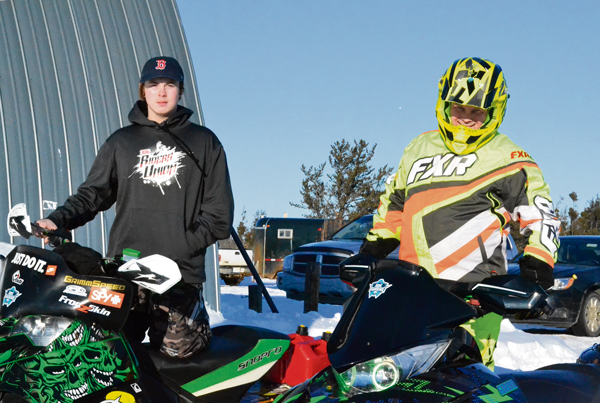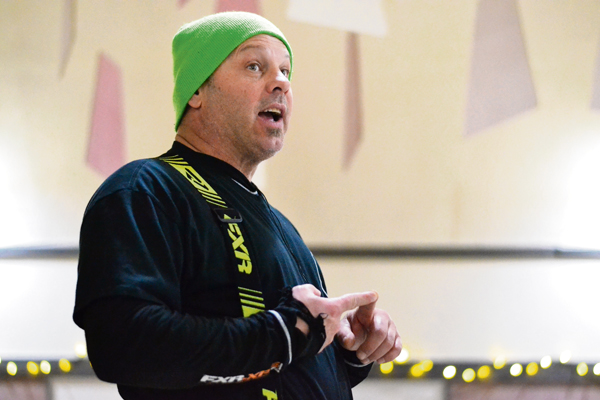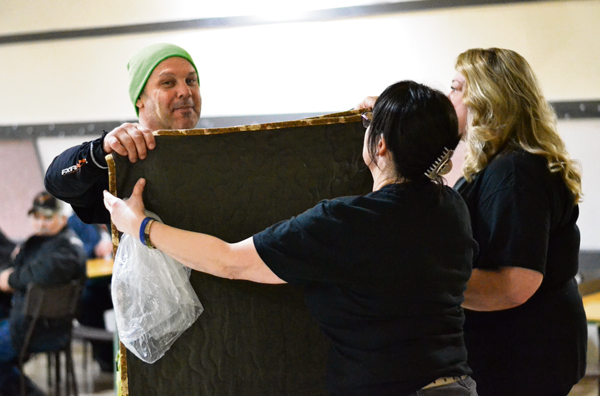
Ride to Survive campaign aiming to spread symptoms and support for post-traumatic stress
Colonsay volunteer firefighter Erik Foster couldn’t get out of bed for over a month after attending a traumatic crash.
The 53-year-old eventually received a post-traumatic stress disorder (PTSD) diagnosis. After his symptoms started bubbling up, his family convinced him to get help.
That’s why Erik and his son Kaine have embarked on a 2,000-kilometre, week-long snowmobile trek for their Ride to Survive campaign—to spread the word that there are supports for PTSD victims and their families.
On Tuesday, the pair visited the Lily Plain Hall just outside of Prince Albert before heading to the Buckland and Candle Lake fire halls.
According to the Centre of Addiction and Mental Health (CAMH), PTSD is “a natural emotional response to frightening or dangerous experiences that involve actual or threatened serious harm to oneself or others.”
Symptoms usually appear within three months of the event, but sometimes don’t appear for years.
CAMH states first responders—including firefighters, police and paramedics—are often exposed to death and injuries that can trigger the mental illness. The symptoms of post-traumatic stress can gradually build up over time.
That’s exactly what happened to Erik, who said he experienced cumulative PTSD.

“I went to a call roughly five years ago. After that call, I stayed awake for three days cleaning up the scene. From there, things went back to normal,” he said.
It wasn’t until another difficult call that occurred years later that the symptoms really started to show.
“The first one just was traumatic. It happened on my street, so there was a lot triggers that would happen overtime…I would see where it happened. I never dealt with that initial one and that’s where the problem really arose.”
Following the second call, Erik said he couldn’t get out of bed other than to go to the washroom. His family got upset, so he moved to the garage.
A therapist came to Erik’s home and convinced him to go to the hospital.
Based on his personal experience, Erik said you’ll know something is wrong if you see some sort of change.
“Sleep patterns, maybe your alcohol or drug consumption…you think you’re having a heart attack, sweating at night, any change. That’s what we’re watching out for because why is that change there?” he questioned.
“We want to deal with it as fast as possible because the brain and the chemical makeup in the brain changes with that change in us.”

He wasn’t the only one affected from his PTSD. He said the Workers’ Compensation Board (WCB) also paid for his family’s therapy.
Kaine, who’s 15 years old, said the most significant aspect of therapy was learning how to focus on his own well-being before anyone else’s.
“When we first started this journey on PTSD…I would stay in my room, I wouldn’t talk, I would go to bed pretty early and I would pretty much just turn everything off and just not bug him because I didn’t want to aggravate him or trigger him,” explained Kaine.
“That’s the worst type of thing I could have done because that puts me down and the most important person is yourself when somebody’s dealing with this because if you aren’t good yourself, then how are you going to help somebody else?”
Erik hasn’t returned to firefighting, and he said he likely never will. There’s still too many triggers, such as flinching every time a child screams, even if it’s a happy giggle.
“(It’s) unbelievable the support that I’ve got from WCB, my therapist…my family, community,” he said.
Erik and Kaine are hoping to spread their stories of hope.
They’re visiting 18 fire halls throughout their week-long trip, which began on Monday.
They’ve rode through Allan, Bradwell and Clavet, then hopped on a trailer through Saskatoon, which is the only time they won’t be on their snowmobiles.
From there, they went to Martensville in minus 30 C weather, to Warman, Hague, Rosthern, Lily Plain, Buckland and Candle Lake. They’ll then circle down to White Swan, Nipawin, Tisdale and Humboldt before returning to Colonsay.
“This is an emotional thing, you know, not only the riding,” said Erik.
“We’re opening up our souls to everybody. That takes some courage.”

